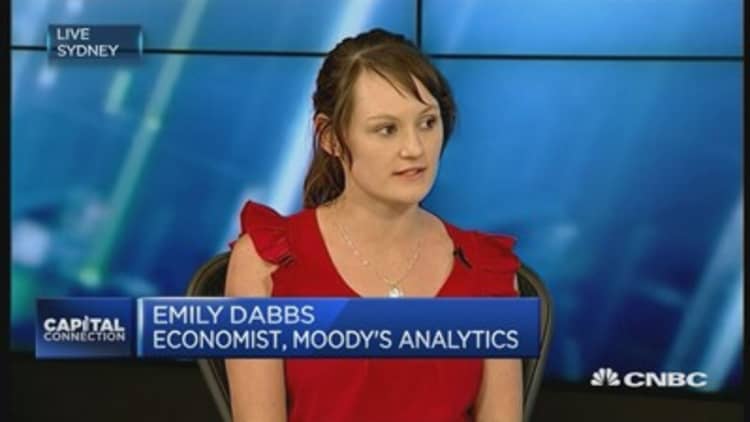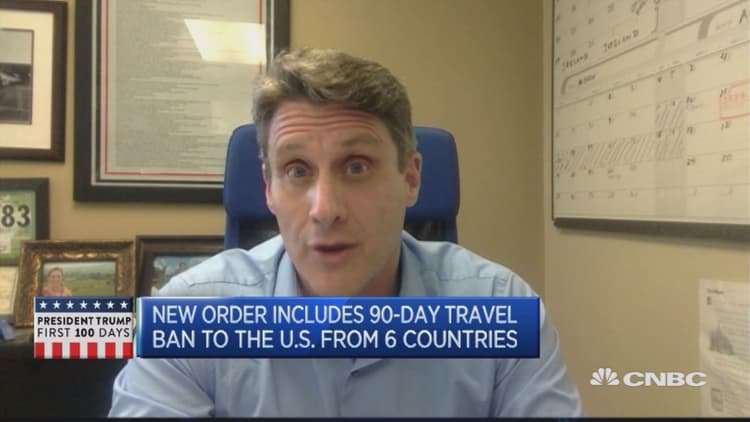Asian shares finished mostly higher Tuesday amid growing expectations among traders that the Federal Reserve could raise interest rates at its March policy meeting next week.
Expectations for a rate hike were at 86.4 percent on Tuesday Asian time, according to the CME Group's FedWatch tool. Also, U.S. factory orders rose 1.2 percent month-on-month and durable goods orders climbed 2 percent, both beating the market consensus.
"Better-than-expected numbers led the market to believe that the Fed will have more reason to raise the interest rate in the FOMC meeting next week," said Margaret Yang, market analyst at CMC Markets, in a Tuesday note.
Down Under, the ASX 200 recovered from a negative start early on to close up 14.88 points or 0.26 percent at 5,761.39, after the Reserve Bank of Australia (RBA) left the cash rate unchanged at 1.50 percent.
The RBA statement by Governor Philip Lowe stated that "the improvement in the global economy has contributed to higher commodity prices, which are providing a significant boost to Australia's national income."
The Australian dollar strengthened to $0.7611 at 3:04 p.m. HK/SIN from the $0.75 handle, following the policy decision.

Japan's lost ground, closing down 34.99 points or 0.18 percent at 19,344.15, extending Monday's losses.
The closed up 0.27 percent or 8.7 points at 3,242.63 and Shenzhen composite finished up 0.3 percent or 6.1 points at 2,031.63. Meanwhile, Hong Kong's index was up 0.32 percent by mid-afternoon.
In South Korea, the Kospi advanced 0.61 percent or 12.69 points to close at 2,094.05, even as geopolitical and political tensions continue to simmer.
The special prosecutor office said that South Korea President Park geun-hye colluded with a friend to take bribes from Samsung Group, aimed at cementing Samsung Chief Jay Y. Lee's control of the country's largest conglomerate, Reuters reported.
The Constitutional Court is expected to make a decision over Park's impeachment as early as this week, while Samsung's Lee will go on trial for bribery and embezzlement on Thursday,
North Korea fired four ballistic missiles on Monday morning, angering its neighbors.
The White House responded to the threat on Monday, and said the U.S. would deploy an advanced anti-missile defense system to South Korea to bolster the country's ability to defend against North Korean ballistic missiles.
"Despite recently emerging Korea-China geopolitical risk, we remain positive on the Kospi outlook. Basically, Kospi is a combination of earnings and valuation multiples, and we are still positive on both," said Sean Lee and Brian Lee, strategists at Citi, in a Monday note.
In other news, Malaysia and North Korea have escalated a diplomatic as a row over Malaysia's investigation of Kim Jong Nam's murder escalates.
On Monday, the American president signed a revised executive order banning citizens from six Muslim-majority countries – including Iran, Libya, Syria, Somalia, Sudan and Yemen - from travelling to the U.S., this time removing Iraq from the list.
"In an overnight trading session really devoid of any major market moving news … there has been some focus on Trump's second attempt at pushing through the controversial travel ban," said Chris Weston, chief market strategist at IG in a morning note.

The slipped 0.24 percent to 20,954.34, as the S&P 500 closed down 0.33 percent to 2,375.31 and the composite dropped 0.37 percent to 5,849.17.
The dollar index was hovering around 101.66 during Asian trade, while the yen continued to remain under the 114 handle, at 113.89 against the greenback.
Brent crude futures dipped 0.36 percent to $55.81 a barrel while U.S. crude was off 0.26 percent at $53.19, as investors continued to search for direction from news out of the CERAweek energy conference in Houston.
Russian Energy Minister Alexander Novak said on Monday that the production deal with the Organization of Petroleum Exporting Countries has led to steadier oil price and less volatility, but Russia will not be joining the cartel.
An International Energy Agency (IEA) report said that global oil supply could struggle to keep up with demand beyond 2020, which could spark a new period of price volatility. But this can be avoided if the industry sees more investments globally, IEA's Executive Director Fatih Birol said.
Follow CNBC International on Twitter and Facebook.
Correction: An earlier version of this article misspelled the name of RBA Governor Philip Lowe.

